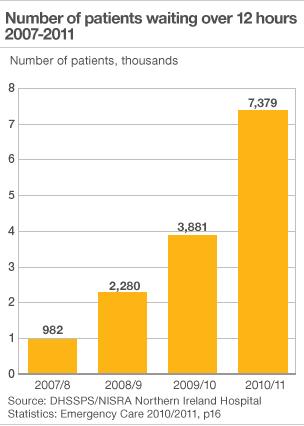NI's five health trusts all breached A&E targets
- Published

A Health Board report found A&E targets were breached by all five health trusts
The number of people waiting for more than 12 hours in Northern Ireland A&E departments here has jumped by a massive 750% in the past five years.
Figures obtained by the BBC show that five health trusts failed to meet their targets.
Performances were particularly poor in Antrim and Belfast.
There were a total of 10,213 breaches of the 12-hour target which states patients must be seen within that period, compared to 7,386 in 2010/11.
End of year performance figures, seen by the BBC, highlight the continued pressure facing emergency departments.
Meanwhile, 80% of patients were treated and discharged or admitted within four hours of their arrival in A&E during 2011/12 - 2% lower than the previous year.
Last year the health minister set a target of 95%.
These figures, and others which show how all the trusts have performed this year, are due to be made public at a meeting of the Health and Social Care Board on Thursday.
Bleaker
The board's chief executive, John Compton, and board members are expected to discuss a range of issues including the performance of the local emergency departments.
Meanwhile, in a separate briefing paper prepared for health committee members the picture is even more bleak.
The paper said there had been a marked increase in breaches in the 12-hour waiting time target.
"In fact, they have increased by 751% since 2007," it said.
It is against this backdrop that health officials, including the health minister and the chief executive of the Health and Social Care Board, insist that the service cannot be sustained in its present form.
The Transforming Your Care document, external, compiled by the chief executive of the Health and Social Care board, John Compton, wants to address the A&E problem by reducing the number of hospitals with emergency Departments.
According to Mr Compton, specialising A&E care in fewer hospitals will be more efficient and effective.
As politicians prepare to debate the future of the Causeway Hospital on Tuesday, these unmet targets, which are due to be published by the Heath Board on Thursday, could not have come at a more critical time.
The SDLP MLA John Dallet said the Causeway Hospital "must be left alone"
"I'm aware that there were seven options considered and a decision will be made on 22 June by the trust," he said.
'Not acceptable'
"But I just hope that they are listening to the wave of anger that exists, not just in the Causeway Coast area alone, but a much wider catchment area.
"So, whatever the bureaucrats are planning, whatever the clinicians are planning, it's not acceptable if it means any reduction in the A&E services in Coleraine."
In March this year, the Health and Social Care Board set up the Improvement action Group, led by Mary Hinds, the director of Nursing and Allied Health Professionals at the Public Health Agency, to improve the quality of care in emergency departments here.
While the group is due to present its final report to the health minister by the end of June, the BBC understands that Mary Hinds is due to give a progress report to the department early this week.
Ms Hinds has a massive role to play in any future decisions that are taken on what emergency services will be axed.
Having spent almost two months in the Northern Health Trust, the health minister and his permanent secretary Andrew McCormick will be asking her opinion on which health trusts are not performing as they should be.
Last week Mary Hinds and Dr Ian Rutter, a GP from England, gave damning reports into the running of Antrim Area Hospital in the Northern Health Trust.
The reports highlighted a catalogue of failings in patient care and criticised the hospital's bureaucratic culture.
The Northern Health Trust said it accepted fully the recommendations contained in the reports.
Health Committee vice-chairman Jim Wells said some trusts were improving.
"It's quite clear the Southern Trust have got their act together, have practices in place and they can treat exactly the same number of patients as the other trusts in much quicker times," Mr Wells said.
"We have to learn from that best practice."
- Published28 May 2012
- Published5 April 2012
- Published5 April 2012
- Published4 April 2012
- Published6 March 2012
- Published9 October 2012